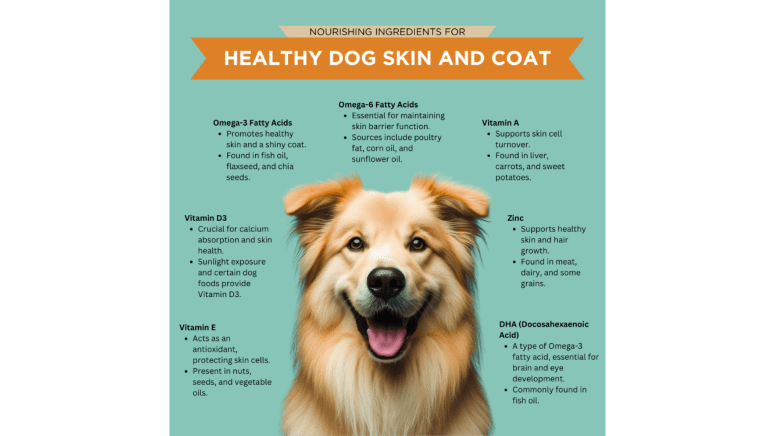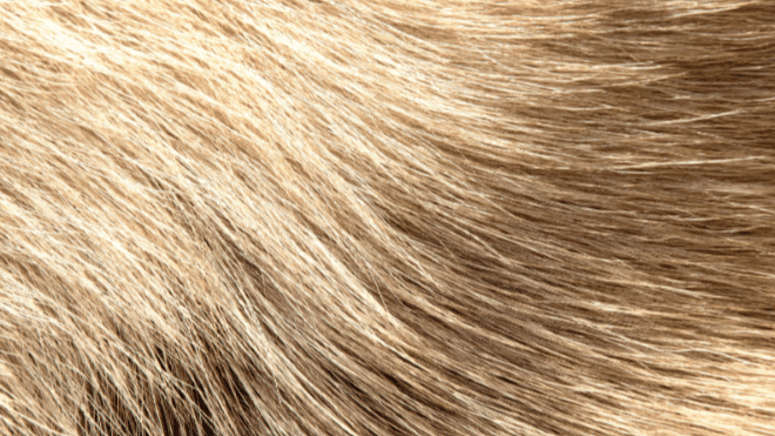Dog Skin and Coat Supplements: The Ingredients Guide
As pet owners, we cherish the well-being of our furry companions.
One visible indicator of their health is the condition of their skin and coat. A shiny, luscious coat and supple, healthy skin not only enhance a dog's wellbeing and comfort but usually also signify their overall wellness.
In this guide, we'll take you through the key ingredients found in dog skin and coat supplements, unraveling the mysteries behind their benefits and how they contribute to canine health. We'll review the following ingredients commonly found in dog skin and coat supplements:
- Omega- 3 fatty acids for Dogs
- Omega- 6 fatty acids
- Vitamin A
- Vitamin D3
- Vitamin E
- DHA
- Zinc

What Ingredients are Good for Dogs’ Skin?
Ensuring your dog's skin remains healthy from the inside out starts with providing them with the right nutrients. Let's dive into some essential ingredients that play a crucial role in maintaining a dog's skin health.
Omega-3 Fatty Acids for Dogs: Nourishing from Within
Omega-3 fatty acids, such as ALA (alpha-linolenic acid), EPA (eicosapentaenoic acid) and DHA (docosahexaenoic acid), are fundamental components of a dog's diet. These fatty acids are known for their anti-inflammatory properties, making them effective in addressing skin conditions in dogs.
Omega-3s work to alleviate itching, reduce redness, and promote a soft, shiny coat. Sources of EPA and DHA include fish oil supplements and certain types of fish like salmon and pollock. Ask your vet about integrating these into your dog's diet for skin health.
Omega-6 Fatty Acids for Dogs: Maintaining Skin Barrier Function
Balancing Omega-3 with Omega-6 fatty acids is essential for a holistic approach to skin health. Omega-6 fatty acids, such as linoleic acid, contribute to maintaining the integrity of the skin barrier. This helps prevent dryness, itchiness, and flakiness, ensuring that your dog's skin remains supple and well-protected.
By striking the right balance between Omega-3 and Omega-6, you can provide comprehensive support for your dog's skin and coat.

Vitamin A for Dogs: The Skin Regenerator
Vitamin A is a vital nutrient for skin health in dogs. It plays a crucial role in cell regeneration, helping to maintain the structure and function of the skin. Adequate levels of Vitamin A can prevent dryness, flakiness, and the development of certain skin infections.
A high-quality, complete and balanced dog food should provide an adequate amount of vitamin A for your dog. If your veterinarian recommends additional vitamin A for your dog, you could include vitamin A-rich foods in your dog's diet, such as cooked liver, broccoli and sweet potatoes. Alternatively, look for dog supplements that contain this essential vitamin for optimal skin health.
Vitamin D3 for Dogs: Sunshine Vitamin for Skin Support
While dogs can produce Vitamin D through exposure to sunlight, feeding a high-quality, complete and balanced dog food ensures they receive sufficient amounts of Vitamin D. Vitamin D3 plays a crucial role in regulating calcium levels, contributing to skin health, and supporting overall well-being.
A balanced diet that includes Vitamin D-rich foods like fatty fish and egg yolks, coupled with appropriate exposure to sunlight, may help maintain your dog's Vitamin D levels.
Vitamin E for Dogs: Antioxidant Armor for Skin Cells
Vitamin E is a potent antioxidant that protects skin cells from damage caused by free radicals. This vitamin not only supports skin health but also contributes to a shiny coat. It aids in maintaining the elasticity of the skin, and promoting overall skin vitality.
Incorporate Vitamin E-rich foods into your dog's diet like bell peppers or pumpkin or opt for supplements containing this essential nutrient.
DHA for Dogs: The Brain/Skin Connection
Docosahexaenoic acid (DHA), an Omega-3 fatty acid, is not only beneficial for cognitive function but also plays a role in maintaining skin health. DHA supports cell structure, contributing to healthy skin and a glossy coat.
Ensuring your dog receives sufficient DHA can have positive effects on both their mental acuity and external appearance. Fish oil supplements and certain types of fish are excellent sources of DHA for dogs.
Zinc for Dogs: Wound Healer and Skin Protector
Zinc is a trace mineral that plays a crucial role in wound healing and overall skin health. It supports the immune system, helping to prevent and heal skin infections.
Zinc also aids in maintaining the skin's barrier function, preventing moisture loss and contributing to a healthy coat. Include zinc-rich foods like meat and dairy in your dog's diet, or consult with your veterinarian to determine if zinc supplementation is necessary.

What Does a Healthy Skin and Coat Look Like for Dogs?
Recognizing the signs of a healthy skin and coat in your dog is crucial for proactive healthcare. A healthy coat is characterized by:
- vibrant shine
- smooth texture
- absence of excessive shedding
- soft and supple
- free from redness or irritation
- devoid of flakiness or dry patches
Regular grooming and attention to your dog's diet can help you maintain their skin and coat in optimal condition. Keep an eye out for any changes, such as excessive itching, dull coat, or skin abnormalities, as these could be indicators of underlying health issues.
Nurturing Your Dog's Skin and Coat
Providing your dog with the right nutrients is key to ensuring their skin and coat remain healthy and vibrant. Work with your vet to determine the best way to incorporate Omega-3 and Omega-6 fatty acids, vitamins A and E, DHA, and zinc into your dog's diet.
Understanding the signs of healthy skin and coat allows you to take proactive steps in maintaining your dog's external health, ensuring they not only look good but feel good, too. Always consult with your veterinarian before introducing new supplements, and tailor your dog's diet to their specific needs for the happiest, healthiest furry friend.

